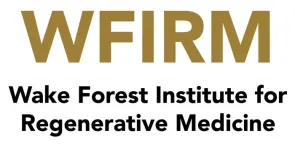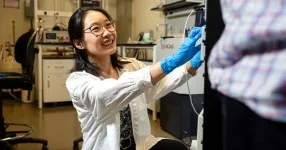(Press-News.org)
In the latest of three online gambling surveys conducted by the University of Massachusetts Amherst, monthly gamblers in Massachusetts reported an increase in gambling intensity and gambling harms. In addition, their attitudes toward gambling have grown more negative.
The online surveys – conducted in 2014, 2022 and 2023 – can’t be generalized to the overall population but give the Social and Economic Impacts of Gambling in Massachusetts (SEIGMA) research team a picture of changing behaviors and attitudes over time among regular gamblers, defined as those who gamble monthly or more frequently.
Gambling behavior expert Rachel Volberg, SEIGMA’s principal investigator and research professor of epidemiology in the School of Public Health and Health Sciences, reported the findings today, Aug. 29, to the Massachusetts Gaming Commission.
Among monthly gamblers in the online surveys, those experiencing gambling problems jumped from 12.7% in 2014 to 20.9% in 2022 to 25.6% in 2023. This compares to a 2% prevalence of problem gambling that held steady in general population surveys conducted before and after casinos were introduced in Massachusetts.
“It’s pretty startling, to be honest,” Volberg says. “While the online panels were not representative of the population, they were very informative in regards to people with gambling difficulties. It’s very helpful from a surveillance and monitoring perspective.”
The survey found increases among monthly gamblers in the online panels in lottery games, sports betting, private wagering, horse racing, bingo and online gambling. This suggests the impact of the pandemic, which deterred gambling behavior, may be diminishing, Volberg says – and also that the pandemic “probably suppressed the gambling behavior of people who were gambling recreationally more than the behavior of people who were at risk for a gambling problem.”
The latest of the three online surveys was carried out shortly after sports betting began in Massachusetts. According to the online surveys, monthly gamblers who said they did not participate in sports betting in the previous 12 months dropped from 78.2% in 2014 to 45.7% in 2023, the year that legal sports betting became fully operational in Massachusetts. In 2023, 28.3% of monthly gamblers said they did sports betting at least weekly, up from 18.8% in 2022 and 7% in 2013.
Volberg hypothesizes that the spate of advertising and news coverage of the legalization of sports betting in Massachusetts may have affected some monthly gamblers in a negative way. “I think it has led people who are already vulnerable to engage or re-engage with this particular type of gambling that’s now getting lots of media attention,” she says.
The latest online survey also showed increases in the proportion of monthly gamblers who believe both that the harm of gambling outweighs the benefits and that gambling addiction is the most important negative impact of casinos. There was a decline in the proportion who believe that employment is the most important positive impact of casinos and that all types of gambling should be legal.
“Based on the general population survey that was done in 2021, I didn’t expect that we would see a big change in attitudes toward gambling, but we do seem to be seeing that, especially among the people betting on sports,” Volberg says.
Volberg says that while online panels are not representative of the population, it is reasonable to assume that the changes in behavior and attitudes of the monthly gamblers in the online panels are likely to reflect changes in how monthly gamblers in the general population might be behaving.
“I think it’s definitely a cause for concern about what the population impacts of sports betting are going to be because these indicators from the monthly gamblers in the online panel are not going in a direction that says there’s going to be less gambling harm in Massachusetts in the future.”
END
The Wake Forest Institute for Regenerative Medicine (WFIRM) proudly announces the appointment of Tim Bertram, PhD, as its new Chief Ecosystem Officer. He will serve as the Chief Executive Officer (CEO) of the U.S. National Science Foundation (NSF) multi-million-dollar long-term investment in commercializing advanced regenerative medical technologies from leading North Carolina academic institutions. With an illustrious career marked by innovation and leadership, Bertram brings decades of transformative ...
Davis, CA — The NEC Society, a nonprofit organization dedicated to preventing necrotizing enterocolitis (NEC), a devastating neonatal intestinal disease, proudly marks its 10th anniversary. Founded by Jennifer Canvasser after the tragic loss of her son, Micah, the organization works tirelessly to build a world without NEC, the disease that killed her child and claims another child every day in the United States.
Canvasser shares, "Ten years ago, patient-families affected by NEC were isolated, and clinician-scientists worked in silos. Over the past decade, we've built an empowered community dedicated to transforming our pain into power and isolation into collaboration.”
Since ...
WINSTON-SALEM, N.C. – Aug. 29, 2024 – A new study from researchers at Wake Forest University School of Medicine is shedding light on how scientific evidence and the uncertainty surrounding three unproven therapeutics were portrayed by the U.S. news media during the early days of the COVID-19 pandemic.
The findings appear online in the Journal of Medical Internet Research Infodemiology.
For the study, the researchers conducted an analysis of 479 reports of hydroxychloroquine, remdesivir and/or convalescent plasma in traditional and online U.S. ...
This summer, Yishu Wang was awarded a $719,000 research grant from the United States Department of Energy (DOE) to study the dynamic and microscopic behaviors of magnets with quantum mechanical properties.
Magnetism originates from electrons in a material. When the electrons in a material all spin in the same direction, as they do in metals like iron, the material is magnetic, with poles that attract or repel other magnetic materials.
“Magnets that we are using today can be viewed as static orderings of electrons, analogous to the static pattern of brushstrokes in a painting,” said Wang, a joint assistant professor in the Department of Materials Science and Engineering ...
Terahertz communications represent the next frontier in wireless technology, promising data transmission rates far exceeding current systems.
By operating at terahertz frequencies, these systems can support unprecedented bandwidth, enabling ultra-fast wireless communication and data transfer. However, one of the significant challenges in terahertz communications is effectively managing and utilising the available spectrum.
The team has developed the first integrated terahertz polarisation (de)multiplexer implemented on a substrateless silicon base which they have successfully tested in the sub-terahertz J-band (220-330 GHz) for 6G communications and beyond.
The University of Adelaide’s ...
Studies have shown that undergraduate students who participate in research activities under the guidance of a faculty mentor are more likely to finish college. That’s one of the many reasons universities like The University of Texas at Arlington are increasing their investment into undergraduate research.
Such research opportunities are not offered at many two-year colleges. To help bridge this gap, Jianzhong Su, professor of mathematics at UTA, is piloting a new program where students from the North Lake campus of Dallas College can come to UT Arlington to participate in a paid research ...
The Department of Energy’s Oak Ridge National Laboratory added a new neutron scattering instrument to its powerhouse of discovery at the Spallation Neutron Source, charting new territory for neutron imaging through artificial intelligence. In July, DOE’s Office of Science approved the final commissioning of the Versatile Neutron Imaging Instrument, or VENUS.
“It’s a dream come true,” said ORNL neutron scattering scientist Hassina Bilheux. “It has been an honor and privilege to ...
A machine-learning tool created by Weill Cornell Medicine and Hospital for Special Surgery (HSS) investigators can help distinguish subtypes of rheumatoid arthritis (RA), which may help scientists find ways to improve care for the complex condition.
The study published Aug. 29 in Nature Communications shows that artificial intelligence and machine learning technologies can effectively and efficiently subtype pathology samples from patients with RA.
“Our tool automates the analysis of pathology slides, which may one day lead to more precise and efficient disease diagnosis and personalized treatment for ...
An ancient gene is crucial for the development of the distinctive waist that divides the spider body plan in two, according to a study publishing August 29th in the open-access journal PLOS Biology by Emily Setton from the University of Wisconsin-Madison, US, and colleagues.
The spider body is divided into two sections, separated by a narrow waist. Compared to insects and crustaceans, relatively little is known about embryonic development in spiders, and the genes involved in the formation of the spider waist are poorly understood.
To investigate, researchers sequenced genes expressed in embryos of the Texas brown tarantula (Aphonopelma hentzi) ...
A new study paves the way to understanding biotic recovery after an ecological crisis in the Mediterranean Sea about 5.5 million years ago. An international team led by Konstantina Agiadi from the University of Vienna has now been able to quantify how marine biota was impacted by the salinization of the Mediterranean: Only 11 percent of the endemic species survived the crisis, and the biodiversity did not recover for at least another 1.7 million years. The study was just published in the renowned journal Science.
Lithospheric movements throughout Earth history have repeatedly led to the isolation of regional seas from the ...








